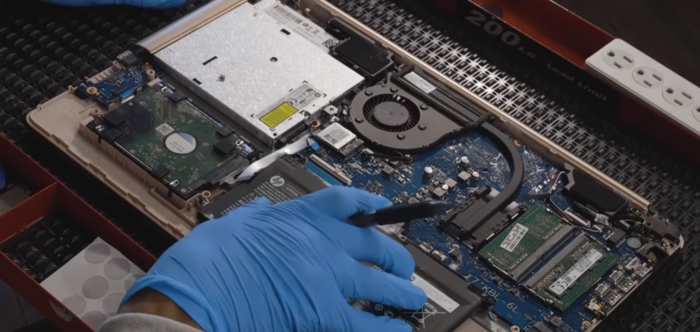When you're in the market for a new laptop, it's easy to be overwhelmed by the array of options available. From sleek designs to vivid displays, the features are endless. But have you ever wondered what makes a laptop faster?
The answer lies in two key components: RAM and the processor. RAM, or Random Access Memory, serves as the computer's temporary storage space, allowing it to access data quickly.
The more RAM you have, the faster your laptop can operate; for example, a laptop with 8GB of RAM runs faster than one with just 4GB. Similarly, the processor speed, measured in gigahertz (GHz), is crucial for overall performance. A 3 GHz machine will outperform a 2 GHz laptop in most tasks.
In essence, for a high-speed laptop experience, pay close attention to these two specifications. To delve deeper into how you can get the most speed out of your laptop, continue reading this article.
How Are Laptops Designed to Function?
Laptops are marvels of modern engineering designed to be portable yet powerful. They combine the functionality of a desktop computer with the convenience of mobility. But how exactly are these compact machines designed to function so efficiently?

At the heart of every laptop lies the central processing unit (CPU), the processor. It acts as the laptop's brain, coordinating all operations and calculations. The CPU works closely with Random Access Memory (RAM) to quickly fetch and process data.
Another crucial component is the laptop's long-term memory, the hard drive or solid-state drive (SSD). All files, applications, and the operating system are stored here. Together with the CPU and RAM, the storage drive is essential for a laptop's smooth and efficient functioning.
Lastly, laptops have various input/output ports and wireless connectivity options. These facilitate data transfer, external device connections, and internet access. Whether it's via Wi-Fi, USB ports, or Bluetooth, these features ensure that your laptop can interact with the world around it.
What Are the Key Components of Laptop?
Laptops are complex devices with a range of components that make them functional and user-friendly. Knowing these key components can help you understand your laptop's performance and capabilities better.

Let's break down what goes into making a laptop tick.
- The Central Processing Unit (CPU) is the laptop's brain. It manages all calculations and operations, affecting overall performance.
- Random Access Memory (RAM) aids the CPU. It stores temporary data for quick retrieval, influencing multitasking and speed.
- The storage drive, usually a Hard Disk Drive (HDD) or Solid-State Drive (SSD), stores long-term data. Files, applications, and the operating system reside here.
- The display screen provides the visual interface. Screen size and resolution are key factors in the user experience.
- A Graphics Processing Unit (GPU) handles video and images. For tasks like gaming or video editing, a strong GPU is essential.
- Input/output ports allow external connections. USB, HDMI, and audio ports are common examples, enabling data transfer and peripheral attachment.
- The battery provides the power. Its life span and capacity determine how long a laptop can operate without external power.
- Wireless connectivity options like Wi-Fi and Bluetooth enable internet access and data sharing. These features keep your laptop connected to networks and other devices.
- The keyboard and trackpad are the primary input devices. They allow for data entry and navigation, respectively.
- Lastly, the cooling system keeps internal components from overheating. Fans or liquid cooling solutions help maintain optimal operating temperatures.
What Makes a Laptop Faster?
When it comes to laptop performance, not all devices are created equal. If you're wondering what contributes to a faster laptop, it's essential to understand key components and how they interact. Let's delve into the specifics that give some laptops the edge over others in speed and efficiency.

Central Processing Unit (CPU)
The CPU is often referred to as the laptop's brain. It performs all the calculations and operations that your tasks require. A higher clock speed, measured in gigahertz (GHz), generally translates to faster performance.
Multiple cores in a CPU can also make a difference. These allow your laptop to handle several tasks simultaneously, enhancing its multitasking capabilities and overall speed.
Random Access Memory (RAM)
RAM is your laptop's short-term memory, storing data for quick retrieval. More RAM means your laptop can handle more tasks simultaneously, thereby improving multitasking and speed.
4GB of RAM is often the minimum for basic tasks, but 8GB or more is better for resource-intensive activities. High-performance laptops may even boast 16GB or 32GB of RAM.
Storage Drive
The type of storage drive you have impacts speed. Solid State Drives (SSDs) are faster than traditional Hard Disk Drives (HDDs). They provide quicker file access and shorter boot times.
The storage capacity also influences your laptop's performance. Having ample free space allows the system to operate more smoothly, avoiding lag and slowdowns.
Graphics Processing Unit (GPU)
For tasks like video editing and gaming, the GPU is crucial. It's responsible for rendering images, animations, and video. A more powerful GPU translates to better graphics and smoother performance.
Integrated GPUs share resources with the CPU, while dedicated GPUs have their own memory. The latter usually provides better performance for graphically intensive tasks.
Connectivity and Ports
Fast and reliable connectivity options like Wi-Fi 6 can make internet tasks quicker. These are particularly important for online streaming and downloads.
Additionally, having multiple high-speed ports like USB-C can speed up data transfer rates. This is beneficial for tasks that require transferring large files quickly.
By understanding these components, you can better evaluate what contributes to a faster laptop. Keep these factors in mind when shopping for your next device
How to Make Your Laptop Faster?
Is your laptop sluggish, taking forever to load applications or files? Boosting its speed can enhance your productivity and overall computing experience. Here are some top tips for making your laptop operate more swiftly.
Update Operating System and Software
Regular updates often include performance enhancements and security patches. Make sure your operating system and all software are up-to-date. This helps your laptop run more efficiently and securely.
Don't ignore prompts for updates, even if they seem trivial. They often contain optimizations that can improve your laptop's speed and overall functionality.
Cleanup Disk Space
Unnecessary files can slow down your laptop. Regularly empty your trash, and uninstall programs you don't use. This frees up valuable disk space and can improve speed.
Disk cleanup tools are helpful for automating this task. They can identify and remove files that are no longer needed, streamlining your system.
Optimize Startup Programs
Too many startup programs can cause your laptop to boot slowly. Go through your startup list and disable unnecessary applications. Focus on keeping only essential software enabled at boot-up.
In Windows, you can use the Task Manager to control startup programs. On Mac, these settings can be managed in System Preferences under “Users & Groups.”
Use an SSD
Upgrading to a Solid-State Drive (SSD) can dramatically improve speed. These drives offer faster read and write times compared to traditional Hard Disk Drives (HDDs).
Transferring your operating system and key applications to an SSD can make your laptop boot up quicker and run more smoothly.
Try Xtra-PC
Xtra-PC is a plug-and-play USB device that can boost your laptop's speed. It works by bypassing your slow or corrupted operating system and running Linux OS directly from the device.

While it doesn't increase hardware capabilities, Xtra-PC can give older laptops a new lease on life. It's especially helpful if software issues are slowing your device down.
Monitor RAM Usage
Overloading your laptop's RAM can cause slowdowns. Keep an eye on your RAM usage and close unnecessary programs running in the background.
For even better performance, consider upgrading your laptop's RAM. More RAM allows for smoother multitasking and quicker data access.
By implementing these tips, you'll be well on your way to a faster and more efficient laptop. Whether you're looking to upgrade hardware or optimize software, these strategies can make a noticeable difference
End Notes
Understanding laptop performance can be complex, but it's crucial when you're looking to get the most out of your device. Initially, it may seem overwhelming to consider all the technical specifications.
You know by now when it comes to what makes a laptop faster, two key components rise to the forefront: the Central Processing Unit (CPU) and Random Access Memory (RAM).
If you're in the market for a new laptop or looking to upgrade, focusing on these areas can yield a device that not only meets but exceeds your performance needs.






